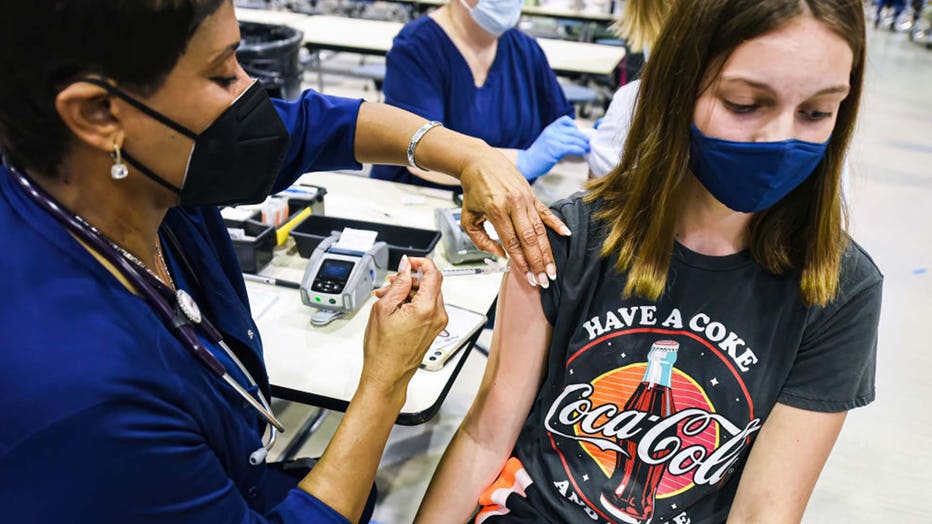CDC: Pfizer COVID-19 vaccine 93% effective at preventing hospitalization in ages 12-18
A recent study released by the U.S. Center for Disease Control and Prevention found that Pfizer’s COVID-19 vaccine was 93% effective at preventing hospitalization in the 12-18 age group.
Between June 1 and Sept. 30 of this year, the CDC performed a case-controlled study of Pfizer’s vaccine in adolescents at 19 pediatric hospitals in 16 states, according to the study published on Tuesday.
"Effectiveness of 2 doses of Pfizer-BioNTech vaccine against COVID-19 hospitalization was 93%, during the period when B.1.617.2 (Delta) was the predominant variant," the study stated.
A total of 464 patients were part of the study and the final analysis was comprised of 179 case-patients and 285 controls.

A nurse gives a dose of the Pfizer vaccine to a girl at a COVID-19 vaccine clinic. (Paul Hennessy/SOPA Images/LightRocket via Getty Images)
RELATED: September was worst month for child COVID-19 infections, AAP says
Among the case-patients and all controls, the median age was 15 years and 72% had at least one underlying condition, including obesity, and 68% attended in-person school, the study continued.
Of the 179 COVID-19 case-patients, six (3%) were vaccinated and 173 (97%) were unvaccinated.
"Overall, 77 (43%) case-patients were admitted to an intensive care unit, and 29 (16%) critically ill case-patients received life support during hospitalization, including invasive mechanical ventilation, vasoactive infusions, or extracorporeal membrane oxygenation; two of these 29 critically ill patients (7%) died," according to the study.
All of the 77 case-patients admitted to the ICU and all 29 critically ill case-patients, and both deaths occurred among unvaccinated case-patients.
RELATED: Moderna COVID-19 boosters: FDA panel endorses lower-dose shots for seniors, high risk
The median length of a hospital stay was five days for unvaccinated patients and three days for vaccinated patients.
As of Oct. 18, 46% of U.S. children and adolescents aged 12–15 years and 54% of those aged 16–17 years have been fully vaccinated against COVID-19, according to the CDC.
"These data suggest that increasing vaccination coverage among this group could reduce the incidence of severe COVID-19 in the United States. Further, as in-person school attendance increases, multicomponent preventive measures to reduce the incidence of severe COVID-19 among adolescents, including vaccination, are imperative," the study concluded.
While kids are at lower risk of severe illness or death than older people, COVID-19 does sometimes kill children — at least 520 so far in the U.S., according to the American Academy of Pediatrics.
RELATED: Fauci: Halloween, Thanksgiving, Christmas gatherings safe for vaccinated people
New data from the AAP showed September was the worst month for child COVID-19 infections.
The peak came during the week ending Sept. 2 when nearly 252,000 child COVID-19 infections were added. According to the chart, more than 6 million children have tested positive for the coronavirus since the pandemic began in March 2020. According to a chart, September 2021 saw the biggest wave in child COVID-19 infections.
The AAP also said the overall COVID-19 infection rate is 8,035 cases per 100,000 children in the population.
Pfizer and its German partner BioNTech said their research shows younger children should get one-third of the dose now given to everyone else. After their second dose, the 5- to 11-year-olds developed virus-fighting antibody levels just as strong as those that teens and young adults get from regular-strength shots.
Meanwhile, Moderna has requested FDA permission to use its vaccine in 12- to 17-year-olds and also is studying its shots in elementary school children. Both Pfizer and Moderna are studying even younger children as well, down to 6-month-olds. Results are expected later in the year.
The Associated Press and Chris Williams contributed to this report.

